Njengamartin399
On this page, you find all documents, package deals, and flashcards offered by seller njengamartin399.
- 141
- 0
- 7
Community
- Followers
- Following
148 items
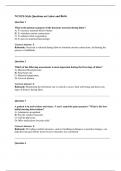
Labor and Birth
Labor and BirthLabor and Birth
- Exam (elaborations)
- • 18 pages •
Labor and BirthLabor and Birth
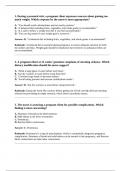
Prenatal Period
1. During a prenatal visit, a pregnant client expresses concern about gaining too much weight. Which response by the nurse is most appropriate? A. "You should avoid carbohydrates and eat mostly proteins." B. "A balanced diet including fruits, vegetables, and whole grains is recommended." C. "It is safe to follow a weight-loss diet if you feel uncomfortable." D. "You can skip meals if your weight gain is excessive." Answer: B. "A balanced diet including fruits, veg...
- Exam (elaborations)
- • 22 pages •
1. During a prenatal visit, a pregnant client expresses concern about gaining too much weight. Which response by the nurse is most appropriate? A. "You should avoid carbohydrates and eat mostly proteins." B. "A balanced diet including fruits, vegetables, and whole grains is recommended." C. "It is safe to follow a weight-loss diet if you feel uncomfortable." D. "You can skip meals if your weight gain is excessive." Answer: B. "A balanced diet including fruits, veg...
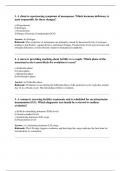
Reproductive System
1. A client is experiencing symptoms of menopause. Which hormone deficiency is most responsible for these changes? a) Progesterone b) Estrogen c) Testosterone d) Human Chorionic Gonadotropin (hCG) Answer: b) Estrogen Rationale: The symptoms of menopause are primarily caused by decreased levels of estrogen, leading to hot flashes, vaginal dryness, and mood changes. Progesterone levels also decrease, but estrogen deficiency is more directly related to menopausal symptoms. __________________...
- Exam (elaborations)
- • 20 pages •
1. A client is experiencing symptoms of menopause. Which hormone deficiency is most responsible for these changes? a) Progesterone b) Estrogen c) Testosterone d) Human Chorionic Gonadotropin (hCG) Answer: b) Estrogen Rationale: The symptoms of menopause are primarily caused by decreased levels of estrogen, leading to hot flashes, vaginal dryness, and mood changes. Progesterone levels also decrease, but estrogen deficiency is more directly related to menopausal symptoms. __________________...
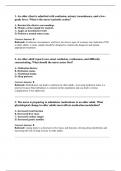
Care of the Older Client
1. An older client is admitted with confusion, urinary incontinence, and a low-grade fever. What is the nurse's priority action? A. Reorient the client to surroundings. B. Obtain a urine sample for analysis. C. Apply an incontinence brief. D. Perform a mental status exam. Correct Answer: B Rationale: Confusion, incontinence, and fever are classic signs of a urinary tract infection (UTI) in older adults. A urine sample should be obtained to confirm the diagnosis and initiate appropriate ...
- Exam (elaborations)
- • 19 pages •
1. An older client is admitted with confusion, urinary incontinence, and a low-grade fever. What is the nurse's priority action? A. Reorient the client to surroundings. B. Obtain a urine sample for analysis. C. Apply an incontinence brief. D. Perform a mental status exam. Correct Answer: B Rationale: Confusion, incontinence, and fever are classic signs of a urinary tract infection (UTI) in older adults. A urine sample should be obtained to confirm the diagnosis and initiate appropriate ...
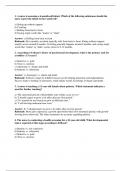
Developmental Stages
1. A nurse is assessing a 6-month-old infant. Which of the following milestones should the nurse expect the infant to have achieved? a) Sitting up without support b) Crawling c) Rolling from back to front d) Saying single words like "mama" or "dada" Answer: c) Rolling from back to front Rationale: By 6 months, an infant typically rolls from back to front. Sitting without support usually occurs around 8 months. Crawling generally happens around 9 months, and saying single words ...
- Exam (elaborations)
- • 17 pages •
1. A nurse is assessing a 6-month-old infant. Which of the following milestones should the nurse expect the infant to have achieved? a) Sitting up without support b) Crawling c) Rolling from back to front d) Saying single words like "mama" or "dada" Answer: c) Rolling from back to front Rationale: By 6 months, an infant typically rolls from back to front. Sitting without support usually occurs around 8 months. Crawling generally happens around 9 months, and saying single words ...
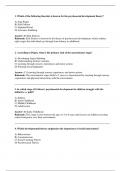
Theories of Growth and Development
1. Which of the following theorists is known for the psychosocial development theory? A) Jean Piaget B) Erik Erikson C) Sigmund Freud D) Lawrence Kohlberg Answer: B) Erik Erikson Rationale: Erik Erikson is known for his theory of psychosocial development, which outlines eight stages that individuals go through from infancy to adulthood. ________________________________________ 2. According to Piaget, what is the primary task of the sensorimotor stage? A) Developing logical thinking B) ...
- Exam (elaborations)
- • 18 pages •
1. Which of the following theorists is known for the psychosocial development theory? A) Jean Piaget B) Erik Erikson C) Sigmund Freud D) Lawrence Kohlberg Answer: B) Erik Erikson Rationale: Erik Erikson is known for his theory of psychosocial development, which outlines eight stages that individuals go through from infancy to adulthood. ________________________________________ 2. According to Piaget, what is the primary task of the sensorimotor stage? A) Developing logical thinking B) ...
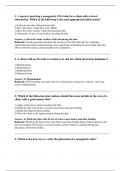
Care of a Client with a Tube
1. A nurse is inserting a nasogastric (NG) tube for a client with a bowel obstruction. Which of the following is the most appropriate initial action? a) Lubricate the tube with petroleum jelly b) Have the client extend their neck slightly c) Have the client swallow while advancing the tube d) Administer 10 mL of water before inserting the tube Answer: c) Have the client swallow while advancing the tube Rationale: Swallowing helps facilitate the insertion of the NG tube into the esophagus, ...
- Exam (elaborations)
- • 19 pages •
1. A nurse is inserting a nasogastric (NG) tube for a client with a bowel obstruction. Which of the following is the most appropriate initial action? a) Lubricate the tube with petroleum jelly b) Have the client extend their neck slightly c) Have the client swallow while advancing the tube d) Administer 10 mL of water before inserting the tube Answer: c) Have the client swallow while advancing the tube Rationale: Swallowing helps facilitate the insertion of the NG tube into the esophagus, ...
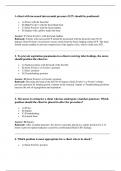
Positioning Clients
A client with increased intracranial pressure (ICP) should be positioned: • A) Prone with the head flat • B) High Fowler's with the head tilted back • C) Semi-Fowler's with the head midline • D) Supine with a pillow under the head Answer: C) Semi-Fowler's with the head midline Rationale: Clients with increased ICP should be positioned with the head elevated 30-45 degrees (Semi-Fowler's) to promote venous return from the brain, helping reduce ICP. The head should remain ...
- Exam (elaborations)
- • 19 pages •
A client with increased intracranial pressure (ICP) should be positioned: • A) Prone with the head flat • B) High Fowler's with the head tilted back • C) Semi-Fowler's with the head midline • D) Supine with a pillow under the head Answer: C) Semi-Fowler's with the head midline Rationale: Clients with increased ICP should be positioned with the head elevated 30-45 degrees (Semi-Fowler's) to promote venous return from the brain, helping reduce ICP. The head should remain ...
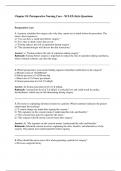
Perioperative Nursing Care
Preoperative Care 1. A patient scheduled for surgery asks why they cannot eat or drink before the procedure. The nurse's best response is: a) "You can have a small meal before surgery." b) "It is okay to drink water, but not eat." c) "Fasting reduces the risk of aspiration during surgery." d) "The anesthesiologist will discuss the diet restrictions." Answer: c) "Fasting reduces the risk of aspiration during surgery." Rationale: Fasting before surgery is im...
- Exam (elaborations)
- • 18 pages •
Preoperative Care 1. A patient scheduled for surgery asks why they cannot eat or drink before the procedure. The nurse's best response is: a) "You can have a small meal before surgery." b) "It is okay to drink water, but not eat." c) "Fasting reduces the risk of aspiration during surgery." d) "The anesthesiologist will discuss the diet restrictions." Answer: c) "Fasting reduces the risk of aspiration during surgery." Rationale: Fasting before surgery is im...
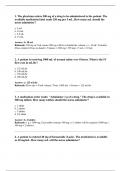
Calculation of Medication and Intravenous Prescriptions
1. The physician orders 500 mg of a drug to be administered to the patient. The available medication label reads 250 mg per 5 mL. How many mL should the nurse administer? a. 5 mL b. 10 mL c. 2.5 mL d. 15 mL Answer: b. 10 mL Rationale: 250 mg in 5 mL means 500 mg will be in double the volume, i.e., 10 mL. Formula: (Dose ordered / Dose on hand) x Volume = (500 mg / 250 mg) x 5 mL = 10 mL. ________________________________________ 2. A patient is receiving 1000 mL of normal saline over 8 hou...
- Exam (elaborations)
- • 22 pages •
1. The physician orders 500 mg of a drug to be administered to the patient. The available medication label reads 250 mg per 5 mL. How many mL should the nurse administer? a. 5 mL b. 10 mL c. 2.5 mL d. 15 mL Answer: b. 10 mL Rationale: 250 mg in 5 mL means 500 mg will be in double the volume, i.e., 10 mL. Formula: (Dose ordered / Dose on hand) x Volume = (500 mg / 250 mg) x 5 mL = 10 mL. ________________________________________ 2. A patient is receiving 1000 mL of normal saline over 8 hou...
